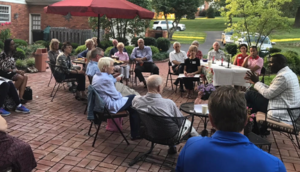In Search of Wisdom
“Jesus loves me, this I know … for the Bible tells me so.”
Living in the information age as we do, there is no shortage of help for navigating life—literally how to get from point A to point B; how to diagnose and self-medicate infirmities; where to find the best home repair people, or investment managers; how to prepare cordon bleu or pumpkin cheesecake, etc., etc.
Man’s desire for knowledge goes back to the Garden of Eden where the fruit of the tree of the knowledge of good and evil became such a snare for Adam and Eve, causing not only their beautiful lives to turn sour, but infecting the whole human race. The serpent blinded them to the fact that they walked and talked with the very Source of knowledge—God Himself—and believed the lie that there was more they could know apart from God. They could be gods! But as we have learned, not all knowledge is healthy. The Apostle Paul wrote, “Knowledge puffs up, but love builds up.” (I Corinthians 8:1)
When asked to summarize the truths of the Christian faith, Karl Barth quoted lyrics penned by Anna Warner Bartlett: “Jesus loves me this I know, for the Bible tells me so.” This posture of humility and simplicity was commended by Jesus when He prayed, “I thank you, Father, Lord of heaven and earth, that you have hidden these things from the wise and understanding and revealed them to little children …” (Matthew 11:25). For those of us who are not too proud to be called ‘little children,’ that is a real “Praise the Lord!”
Proverbs 1:7 reminds us that “The fear of the Lord is the beginning of knowledge; fools despise wisdom and instruction.” Timothy Keller observed that, “one of the main messages of Proverbs is that you’ve never really thought enough about anything … too often we just want to have someone tell us what to do.”*
Wisdom is less about information and more about relationship—relationship to its Source.
Paul wrote to the Colossians of his great struggle for them “that their hearts would be encouraged, being knit together in love, to reach all the riches of full assurance of understanding and the knowledge of God’s mystery, which is Christ, in whom are hidden all the treasures of wisdom and knowledge.” And to the Ephesians he wrote, “… and to know the love of Christ that surpasses knowledge that you may be filled with all the fullness of God.” (3:19)
In a spiritual sense, the old adage is true: “It’s not what you know, but Who you know that counts.” Knowledge apart from God builds up self-reliance and produces a hardening toward the things of God. As in the Garden, that fruit proves to be a very poor substitute for knowing (an intimate term) and delighting in the wisdom and understanding of God. James wrote that wisdom from above is “first pure, then peaceable, gentle, open to reason, full of mercy and good fruits, impartial and sincere,” producing the sweet fruit of righteousness. (James 3:17)
Where do you first go for wisdom in navigating life? What fruit is being produced by your pursuit?
Who is wise and understanding among you? By his good conduct let him show His works in the meekness of wisdom. (James 3:13)

*Timothy Keller, “God’s Wisdom for Navigating Life,” Penguin Random House, New York, ix.

